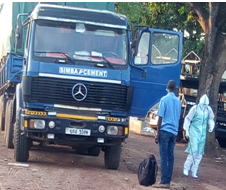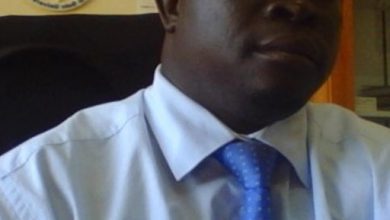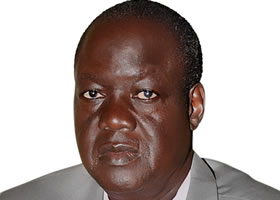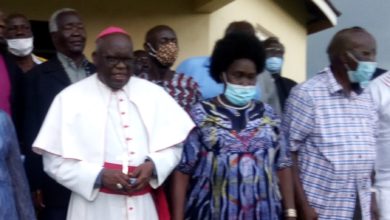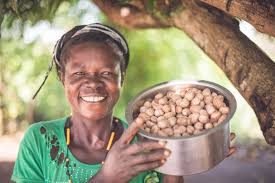
Global Politics
UGANDA: NORTHERN UGANDA INVESTMENT CONFERENCE, SCOOP ACHOLI NATIONAL CONFERENCE.
Mr. Collins Apuoyo the current Team Leader NUTEC MD who has vast private sector development experience in several African Countries including Kenya, South Sudan, Zimbabwe, Nigeria and Uganda with specific focus on Agribusiness over the last 15 years, a Luo from Kenya brought international conference to discuss Northern Uganda Agenda in Gulu City to be.
Through NU-TEC MD Programmes organizing its first ever investment conference, under the theme “Northern Uganda- the Emerging Investment Frontier” to initiate dialogue among various interest groups- public and private sector firms, investors and local communities. That aims to explore partnerships and identify high-growth investment opportunities that will generate economic, social and environmental retunes in Northern Uganda have been born with ten agenda.
GULU-UGANDA: Mr. Collins Apuoyo the mover of Northern Uganda Investment Conference has developed keen interest in social entrepreneurship, Inclusive Business modeling and Impact Investment. He is an Ashoke fellow and has won numerous global awards in social entrepreneurship.
The ten agenda are underlines as follow: investment climate of Northern Uganda, industrial parks in Northern Uganda, and opportunities for value addition, impact investment, exploiting opportunities in livestock in northern Uganda.
Others are derisking crop farming commercial and cooperative models, foreign investor respective, ICT for business, getting investment ready, commercial forestry in northern Uganda and lastly ECO and AGRO-tourism a climate smart investment.
Thus, the organizers’ concern is that, the Northern Uganda-Transforming the Economy through Climate Smart Agri-Business Market Development (NU-TEC-MD) programme I a five-years DFID funded programme implemented by Palladum that aims to increase the incomes and climate resilience f poor men and women in Northern Uganda by:
- Stimulating sustainable, pro-poor growth in selected agricultural markets and
- Improving the position of poor men and women within these market systems by making the market systems more inclusive.
Mr. Apuoyo note that NU-TEC-MD sees a move away from traditional subsistence aid, instead looking towards knowledge sharing and relationship building with the intention of identifying attracting and supporting investments that drive growth for smallholders in Northern Uganda, he stressed.
Adding that there is a particular emphasis on catalyzing change for women and vulnerable groups, youth, persons with disabilities (PWDs), and the very poor as such, UN-TEC MD operating within the making markets work to the poor, or M4P framework, supporting pioneering firms to navigate the constraints of operation in the agro-economic of Northern Uganda, co-developing and piloting inclusive business models that generate economic, social and environmental returns.
Mr. Apuoyo says Northern Uganda is poised to become a major player in trade and investment within the agribusiness space, with improved connectivity, and major breakthroughs in peace, security and infrastructure. The rate of growth in the region has been impressive, he argued.
“Over the past five years, the region has registered the highest growth in per capita consumption expenditure at 21.3 percent and poverty felt by 11 percent in the same period (UBOS, 2018). It also has a growing class of middle income consumers and its three emerging cities, Gulu, Lira and Arua are good exit routes for regional export presently.” Mr. Apuoyo commented.
He argues that the region hosts over 100 large scales commercial farms, an estimated 1,500 commercializing farmers as well as a number of processing and manufacturing industries of different scales and sizes. For agriculture and related investments, its good rains, welcoming people and fertile soils place northern Uganda as a key investment destination.
Mr. Apuoyo says Northern Uganda various commercial endeavors from crop production to livestock, forestry and agro processing have already made admirable returns on investment.
Further more he noted that Uganda’s agricultural landscape is generally considered by investors to be among the best in Africa, and indeed Northern Uganda in particular has some of the most fertile soils and favorable weather in the country that can support many varieties of crops, trees and livestock. Additional, northern Uganda hosts some of Uganda’s largest tracts of farmland in terms of key infrastructure, the construction of the 600 MW Karuma Hydro Power Dam and Aswa II, slated to be launched by December 2019, will ease the current energy needs for those intending to invest in processing and manufacturing facilities.
He further says government of Uganda is also improving road networks in the region has grown and become more affordable for people, finished products and raw materials. Furthermore, other ongoing ambitious infrastructure projects like emerging industries parks, high speed internet connection, the Gulu Logistics Hub and others are increasing ease of doing business while connecting the north to other important trade hubs in Kenya, South Sudan and DR Congo.
Mr. Apuoyo says this improved environment has seen a number of companies based in Northern Uganda seek to increase export of grains and semi-processed agric-products, many Kampala based businesses also buy directly from suppliers the north and export to trade hubs in Middle East, South Asia, Europe and other African Countries with very little values-added. He said.
Adding that in addition, businesses from Kenya, South Sudan and DR Congo, source grains from Northern Uganda at the end of harvest season,. the region has become a major source of oil seed cake supporting the animals feed sector. Production of key export crops such as sesame and chia is increasing in the area, and there is potential too in other fresh foods and other special market.
Denise Ojok a farmer from Odek Sub County, Omoro District agree with Northern Uganda investment programme concept, but have reservation of sustainable viability of Agro-processing food crop argues that Northern Uganda TECMAD did not come out with marketing strategic plan. Although Northern Uganda producing food crops, but the buyers from South-western Uganda do processed the crops from their households especially Acholi Sub Region, the position which confirmed by Mr. Collins Apuoyo.
A case in point, Mr. Ojok says Omoro, Pader and Gulu districts is now a major producer of Soya bean, produced over 2 million metric tones per annum, but because we do not have ready market, producers end up selling a kilo of Soya bean at UGX 1,600, later buyers would go and sell at higher prices at UGX 4,000 in Lango Sub Region and other parts of Uganda.
“I see that the agenda for Northern Uganda TEC MD Pallodim is a good guestier, but still leave grassroots community with burden of marketing.” Mr. Ojok alluded.
Mr. Martin Ojara Chairman Gulu District in his closing remark revealed that Gulu City which will soon be declare in 1st July 2020, have acquired 200 acers in Oding just about 10 kilometer East of Gulu City. He further says Gulu will soon have international Huber at Layibi railway station that is going to be a big hub for economic development and connectivity to South Sudan and DR Congo, he notes.
“We hope that the investors who want to come and invest in Northern Uganda, the government of Uganda have already launched and open Gulu Industrial Parks last month, land is available for investments.” Mr. Ojara adds.
Mr. Ojara in equally worrying tone says although Electricity Regulatory Authority ERA has been disappoint investments in Gulu, where many investors has left the region due to electricity failure, last week he met the company who has constructed Aswa II Dam, the management agreed that within 15 days in December power line will reach Gulu. Ojara conclude.
In second edition, Oyeng Yeng News will produce second edition.
UGANDA: NORTHERN UGANDA INVESTMENT CONFERENCE, SCOOP ACHOLI NATIONAL CONFERENCE.
Mr. Collins Apuoyo the current Team Leader NUTEC MD who has vast private sector development experience in several African Countries including Kenya, South Sudan, Zimbabwe, Nigeria and Uganda with specific focus on Agribusiness over the last 15 years, a Luo from Kenya brought international conference to discuss Northern Uganda Agenda in Gulu City to be.
through NU-TEC MD Programmes organizing its first ever investment conference, under the theme “Northern Uganda- the Emerging Investment Frontier” to initiate dialogue among various interest groups- public and private sector firms, investors and local communities. That aims to explore partnerships and identify high-growth investment opportunities that will generate economic, social and environmental retunes in Northern Uganda have been born with ten agenda.
GULU-UGANDA: Mr. Collins Apuoyo the mover of Northern Uganda Investment Conference has developed keen interest in social entrepreneurship, Inclusive Business modeling and Impact Investment. He is an Ashoke fellow and has won numerous global awards in social entrepreneurship.
The ten agenda are underlines as follow: investment climate of Northern Uganda, industrial parks in Northern Uganda, and opportunities for value addition, impact investment, exploiting opportunities in livestock in northern Uganda.
Others are derisking crop farming commercial and cooperative models, foreign investor respective, ICT for business, getting investment ready, commercial forestry in northern Uganda and lastly ECO and AGRO-tourism a climate smart investment.
Thus, the organizers’ concern is that, the Northern Uganda-Transforming the Economy through Climate Smart Agri-Business Market Development (NU-TEC-MD) programme I a five-years DFID funded programme implemented by Palladum that aims to increase the incomes and climate resilience f poor men and women in Northern Uganda by:
- Stimulating sustainable, pro-poor growth in selected agricultural markets and
- Improving the position of poor men and women within these market systems by making the market systems more inclusive.
Mr. Apuoyo note that NU-TEC-MD sees a move away from traditional subsistence aid, instead looking towards knowledge sharing and relationship building with the intention of identifying attracting and supporting investments that drive growth for smallholders in Northern Uganda, he stressed.
Adding that there is a particular emphasis on catalyzing change for women and vulnerable groups, youth, persons with disabilities (PWDs), and the very poor as such, UN-TEC MD operating within the making markets work to the poor, or M4P framework, supporting pioneering firms to navigate the constraints of operation in the agro-economic of Northern Uganda, co-developing and piloting inclusive business models that generate economic, social and environmental returns.
Mr. Apuoyo says Northern Uganda is poised to become a major player in trade and investment within the agribusiness space, with improved connectivity, and major breakthroughs in peace, security and infrastructure. The rate of growth in the region has been impressive, he argued.
“Over the past five years, the region has registered the highest growth in per capita consumption expenditure at 21.3 percent and poverty felt by 11 percent in the same period (UBOS, 2018). It also has a growing class of middle income consumers and its three emerging cities, Gulu, Lira and Arua are good exit routes for regional export presently.” Mr. Apuoyo commented.
He argues that the region hosts over 100 large scales commercial farms, an estimated 1,500 commercializing farmers as well as a number of processing and manufacturing industries of different scales and sizes. For agriculture and related investments, its good rains, welcoming people and fertile soils place northern Uganda as a key investment destination.
Mr. Apuoyo says Northern Uganda various commercial endeavors from crop production to livestock, forestry and agro processing have already made admirable returns on investment.
Further more he noted that Uganda’s agricultural landscape is generally considered by investors to be among the best in Africa, and indeed Northern Uganda in particular has some of the most fertile soils and favorable weather in the country that can support many varieties of crops, trees and livestock. Additional, northern Uganda hosts some of Uganda’s largest tracts of farmland in terms of key infrastructure, the construction of the 600 MW Karuma Hydro Power Dam and Aswa II, slated to be launched by December 2019, will ease the current energy needs for those intending to invest in processing and manufacturing facilities.
He further says government of Uganda is also improving road networks in the region has grown and become more affordable for people, finished products and raw materials. Furthermore, other ongoing ambitious infrastructure projects like emerging industries parks, high speed internet connection, the Gulu Logistics Hub and others are increasing ease of doing business while connecting the north to other important trade hubs in Kenya, South Sudan and DR Congo.
Mr. Apuoyo says this improved environment has seen a number of companies based in Northern Uganda seek to increase export of grains and semi-processed agric-products, many Kampala based businesses also buy directly from suppliers the north and export to trade hubs in Middle East, South Asia, Europe and other African Countries with very little values-added. He said.
Adding that in addition, businesses from Kenya, South Sudan and DR Congo, source grains from Northern Uganda at the end of harvest season,. the region has become a major source of oil seed cake supporting the animals feed sector. Production of key export crops such as sesame and chia is increasing in the area, and there is potential too in other fresh foods and other special market.
Denise Ojok a farmer from Odek Sub County, Omoro District agree with Northern Uganda investment programme concept, but have reservation of sustainable viability of Agro-processing food crop argues that Northern Uganda TECMAD did not come out with marketing strategic plan. Although Northern Uganda producing food crops, but the buyers from South-western Uganda do processed the crops from their households especially Acholi Sub Region, the position which confirmed by Mr. Collins Apuoyo.
A case in point, Mr. Ojok says Omoro, Pader and Gulu districts is now a major producer of Soya bean, produced over 2 million metric tones per annum, but because we do not have ready market, producers end up selling a kilo of Soya bean at UGX 1,600, later buyers would go and sell at higher prices at UGX 4,000 in Lango Sub Region and other parts of Uganda.
“I see that the agenda for Northern Uganda TEC MD Pallodim is a good guestier, but still leave grassroots community with burden of marketing.” Mr. Ojok alluded.
Mr. Martin Ojara Chairman Gulu District in his closing remark revealed that Gulu City which will soon be declare in 1st July 2020, have acquired 200 acers in Oding just about 10 kilometer East of Gulu City. He further says Gulu will soon have international Huber at Layibi railway station that is going to be a big hub for economic development and connectivity to South Sudan and DR Congo, he notes.
“We hope that the investors who want to come and invest in Northern Uganda, the government of Uganda have already launched and open Gulu Industrial Parks last month, land is available for investments.” Mr. Ojara adds.
Mr. Ojara in equally worrying tone says although Electricity Regulatory Authority ERA has been disappoint investments in Gulu, where many investors has left the region due to electricity failure, last week he met the company who has constructed Aswa II Dam, the management agreed that within 15 days in December power line will reach Gulu. Ojara conclude.
In second edition, Oyeng Yeng News will produce second edition.

